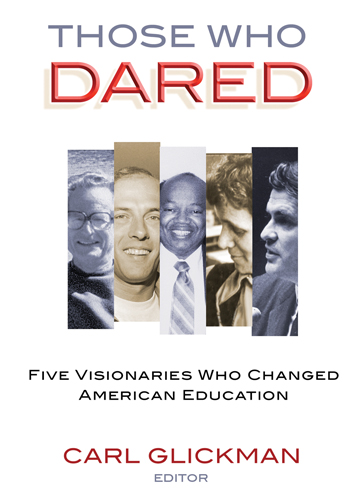Daring to Change U.S. Education
In Those Who Dared: Five Visionaries Who Changed American Education, published by Teachers College Press (2008), a group of path-breaking education reformers—including two with direct ties to TC—recount their efforts to change the way American schools work. The volume was edited by Carl Glickman, President of the Institute for Schools, Education, and Democracy.
James Comer, a TC Trustee, physician, and Maurice Falk Professor of Child Psychiatry at Yale’s School of Medicine, ponders the question of why he did so well in school, while some of his classmates, who were also African American and as intelligent as he, did not. Comer went on to create the Child Development School Model in New Haven, in which, writes Glickman, “Schools became hubs of caring for students’ developmental needs.”
TC’s William H Kilpatrick Professor of Economics and Education, Henry Levin, poses a different question: In a country where we guarantee equal access to education but not equal funding to every school, how do we deliver a quality (Levin’s emphasis) education to every child, regardless of the resources available in a particular community? As a professor at Stanford, Levin saw what was available to children in “gifted and talented” or “accelerated” programs, and he “wanted all children to be treated as gifted and talented,” he writes. Levin founded the Accelerated Schools Project, which proliferated across the nation, and now analyzes the costs and benefits of investment in education.
John Goodlad began his education career in a one-room school in Surrey, British Columbia, where he came to believe that children of different ages can learn together. The idea that successful schools are “closely tied to the care of our democracy” prompted him to create the League of Democratic Schools with an agenda that works “only if…advanced by policymakers, educators and local communities working together.”
Deborah Meier’s Central Park East School and Central Park East Secondary School in Manhattan were based on the revolutionary notion that schools perpetuated class inequalities in America and had to be changed in order to offer a good education to poor children. Meier is viewed by many as the mother of what’s come to be known as the small schools movement.
Ted Sizer founded the Coalition of Essential Schools in Oakland, California, which has assisted a range of school reform movements across the country. At the heart of Sizer’s credo is the belief that “an idea, or ideas, can drive reform and the practice that reflects that reform.”
This is an inspiring guide for those wishing to carry on the important work of renewing
Published Tuesday, Jan. 6, 2009
